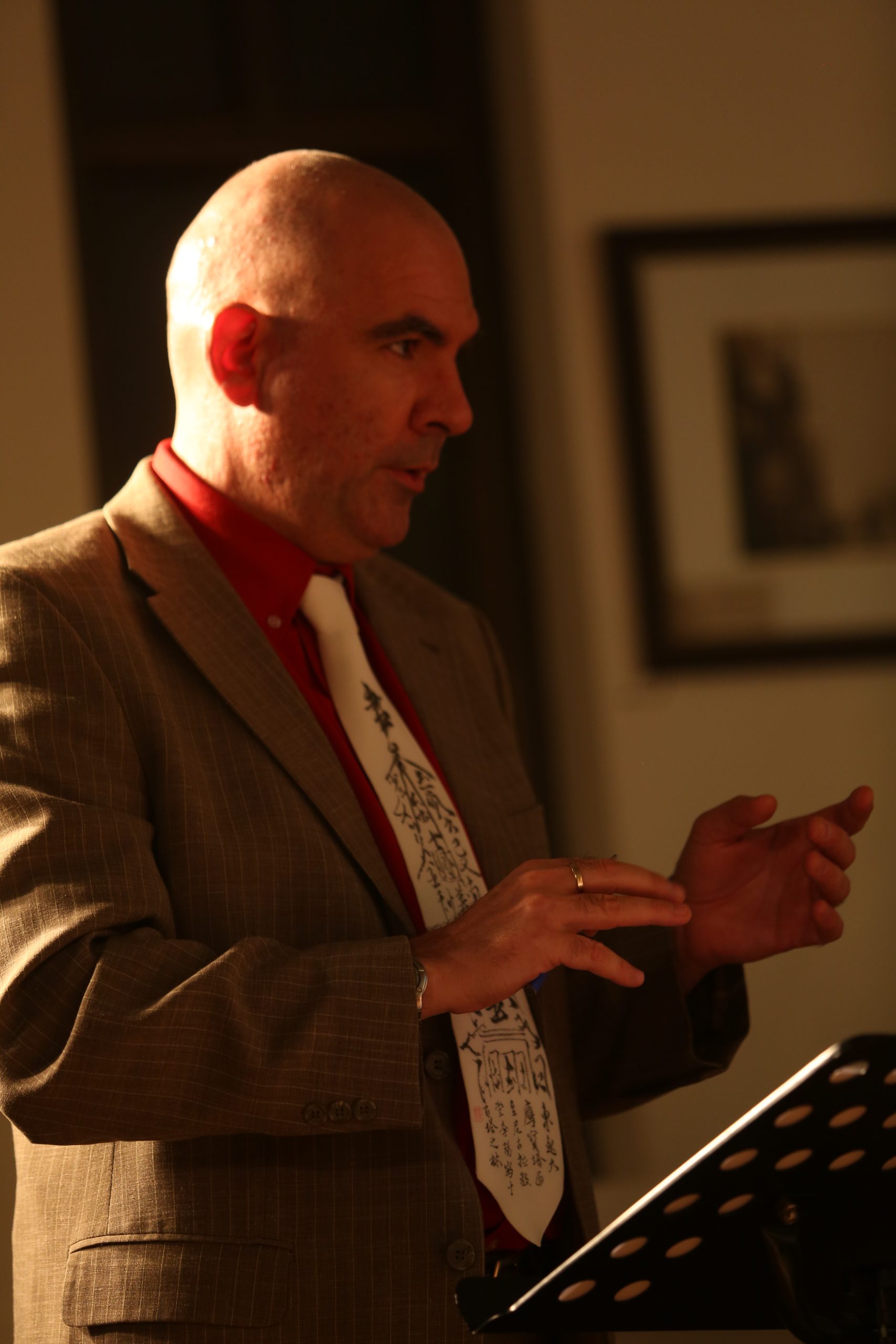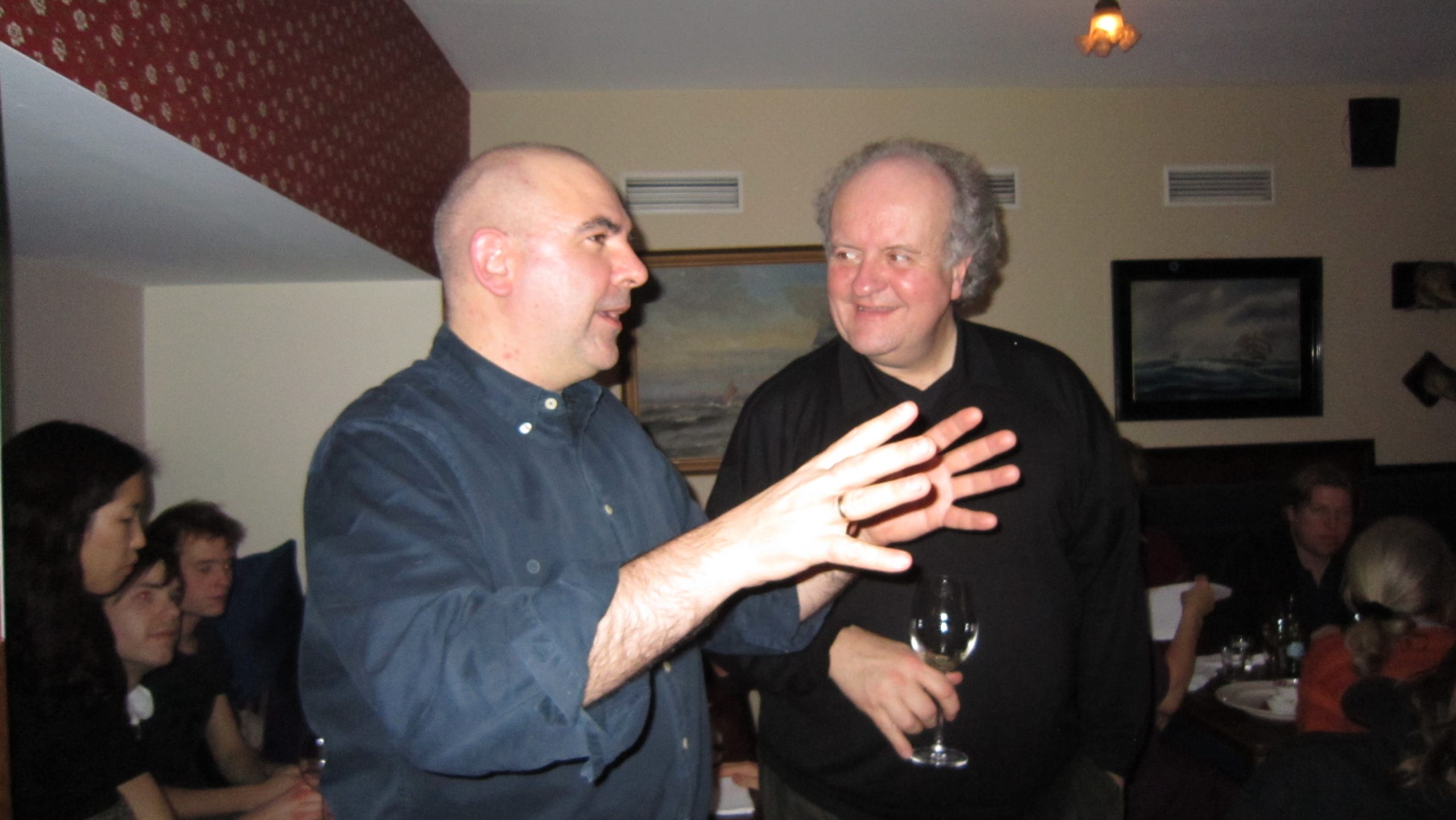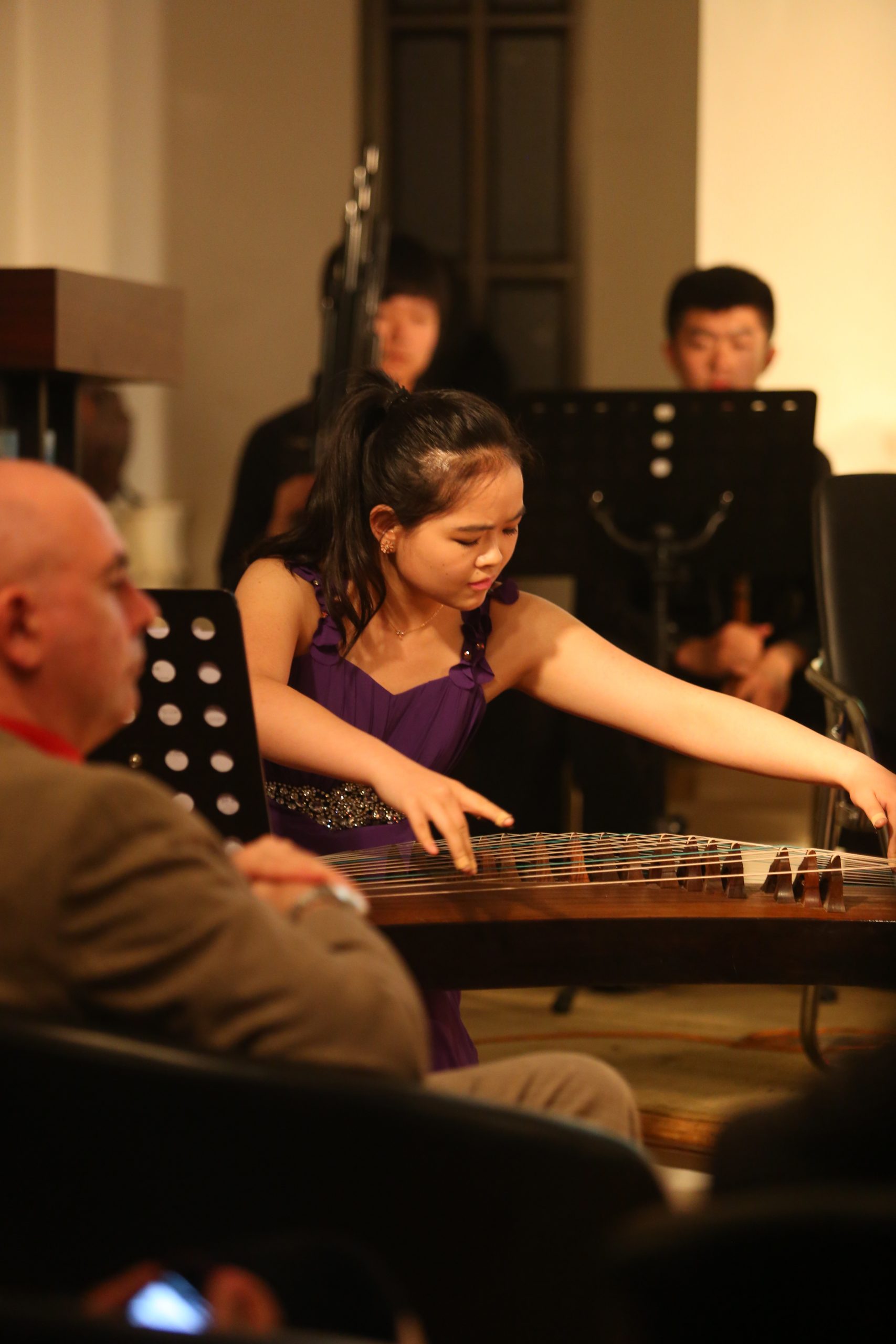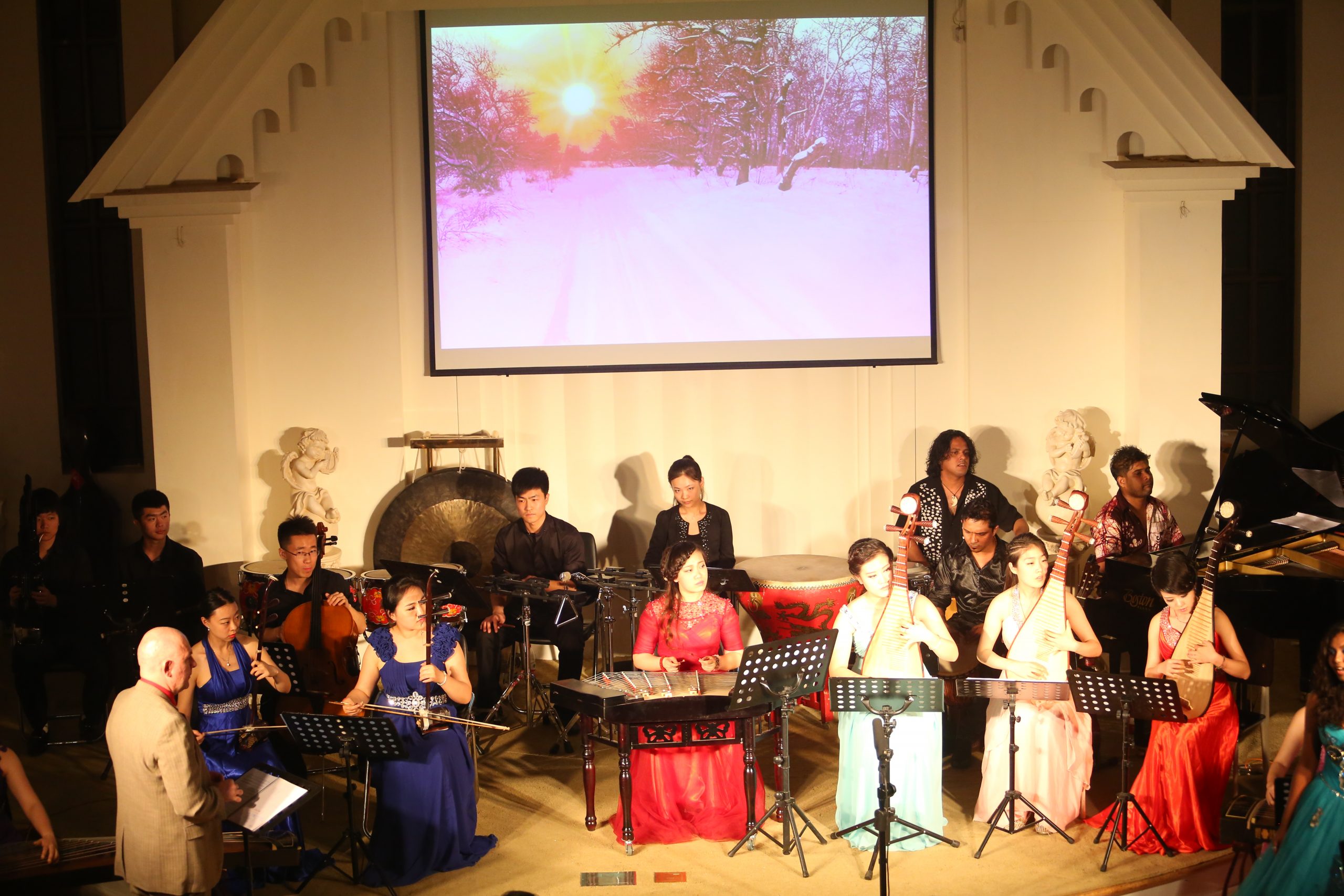Juscheld, Composer
In his words
Juscheld composer of the Oratorio Apocalypsis Iesu:
Music holds together the multifaceted world I inhabit, binds me to it providing clues to its meaning, our meaning perhaps.
(Excerpt of Music for a Mushroom Cloud, IV Mov)
“Music is the faint echo heard from inside a cloud chamber. Radiant moments of inspiration pass us by at near the speed of light. We see, but so briefly. Our eyes cannot pierce through the haze otherwise. We feel. But what? Your image is here, in front of me, pristine clear it may seem. All objects are tangible. Yet forms are opaque, absorbing emissions, providing a shore for all waves to lap, for all waves to clash. Silence is the key for those who have ears, and those who have ears may hear and then listen. And then, only then, music happens. And with that sound comes light, too, flooding or faint, but present.”

Gazing and letting the mind form the words, like petals plucked distractedly, irreversibly, from the flower that is life, you may take yourself as seriously as flowers and bees do.
An approach
Juscheld’s musical work is his true biography. The technical side, his studies, festivals, lectures, concerts featuring his music, orchestras and ensembles he conducted, play a part in the way Juscheld developed as a composer. Only, to look for the motivational sources there would be like looking in the wrong direction. The same as the ancient Greek titans, there is a force leading us irrationally that was there before the light of consciousness and the blinding flash of our cherished ego.[1]The mention of the “ancient Greek titans” in the passage likely refers to the Titans in Greek mythology, who were primordial beings of immense power and influence, existing before the … Continue reading
When the commission to write about Juscheld and his music was first insinuated I myself, being his other side, had a good deal of misgivings and misapprehensions: here was a man, a music composer (yet another) known partially to himself, with few and fewer friends and distancing relatives; awkward in communicating, elusive, and with those big but quiet ambitions that crawl and claw like ivy and bloom in the dark.
But I gave in
Just like that character in Jeff Noon’s The Body Library (an unfortunate book, with so much wasted potential. And just for this very reason perhaps appropriately mentioned here). I began to follow someone else’s story in a world where every-body has one already: I began to play detective in a plot that was rigged from the start.
So let me retrace my steps, or what may be just the same, Juscheld’s.
My music comes from all the music I have heard, and possibly from that that I have not heard too. When my parents were young and in love, they listened to music, and that they shared with me. Love and music make a powerful, magical mixture. I drank from it and expected from life nothing less ever since.

My first tunes and harmonies came from popular songs and traditional music from Spain, Mexico, Peru, Colombia, Cuba, Venezuela… that colourful world of wonders that still speaks Greek and Latin every day; a presence without awareness.”
Moving on
Juscheld, as I know by experience, grew up with irresistible beats and compelling rhythms. The exotic beauty of those melodies marked his taste forever and the strangeness of all became normalized in his music. “Later, much later”, he continues, “I bought a now old-fashioned LP because I liked the cover. There was something “classical” about that picture (I knew it even then) some unperturbed serenity that stilled the momentous teenage years.”
A different kind of beauty was present on that cover, one that did not pump, or made your body move: but one that was just as primeval and arcane. The winds blowing from the north had reached the island shores where gentle waves bathe brown-roasted tanned tourists; a group of pitiful small islands in the Atlantic Ocean with locals as unproductive as they are uninteresting. For Juscheld, though, the German masters had arrived, and with them they brought a pile of scores: musical edifices never pictured before in his imagination until then. Until now.
And so I knocked at the door and they let me in. Later on my teenage years became confused and turbulent and the project, the mere sight of beauty, became more and more rare.
“Rock” and its retinue of bad attitude and long-haired despondency became the controlling opiate that diluted Juscheld’s sense of failure and inadequacy: UK ruled OK, and almost took with it a musical promise. “It was then, as despair set in” the composer says, “and the abject ape began to laugh over the remains of what man could be, that I heard those tunes again, now transformed.”

Influence and Change
Gustav Mahler, of course, the crusader of beauty and defender of feeling, at times booed, his music derided, now mostly adored, saved possibly more than just his career. “In the true viscosity of vice and pointlessness, he once told me, “I began to understand. To understand with some organ of perception I was not aware we had.”
And so he quit the “life of ease”. Numerous years still passed before he gathered the skills necessary to write down the way it felt. To put down on paper, now digital, what was really worth saving in order to allow the titanic to cling to it and dictate whatever came next. The journey is still underway, all submarine summits and treacherous trenches. It was in those years that I met Juscheld (I believe) for the first time. Little did I know that those brief meetings would mark me as the future biographer of the composer-to-be.
I am a traveling article writer, and a budding novelist. Unlike Juscheld I read fiction (a lot of it), and am also more sensory inclined that the composer. I studied conducting, somehow unsuccessfully (this is how I met Juscheld the first time, although our paths had possibly crossed before, as I will relate some other time), but I consider myself an observer of peoples and a critic of manners in a global world. And that it may be. For all I know and care. I am a product of it as much as anyone else, and so is Juscheld and all of his music, however occult and mystic the halo that hangs all around it. My biography, one that no one will write, runs parallel with the composer’s. We were together right from the start, although we never became aware of it. We walked the same streets, visited the same beaches, and (I believe) had common friends too, now unreachable at least to me. But let us go back to the composer.

The composer
BA at the Royal Welsh College of Music and Drama with Peter Reynolds, graduating with a symphonic piece Exposicion y Transformación, recorded by the BBC NOW, and other pieces with the PM Music Ensemble. MA and PhD at the Estonian Music Academy, with graduation pieces such as the guitar concerto Dos Mundos (Parnu City Orchestra, Risto Joost), and the string ensemble arrangement of Music for a Mushroom Cloud (Risto Joost conducting).
Estonia was an important part of Juscheld’s musical career, and it may have influenced him in subtle ways, although I do not see the influence that Arvo Part may have had in his writing. I had some master classes with him at the academy, listened and analyzed his music, and so I can attest that Juscheld’s musical thinking has very different roots and means of expression to those of the Estonian “holy minimalist”, as Juscheld often calls him (quoting Richard Taruskin).
He has written for a good and diverse number of ensembles and soloists in the past few years, attending to commissions, or simply for the sake of the music itself. He has also written for Western and Asian musicians and worked with experienced conductors.
Oratorio
The Oratorio Apocalypsis Iesu project, which has been written for more than half, and Juscheld tells me, was not welcome at all. Since the guitar concert, the composer had made the decision to write only for musical groups, or ensembles, reduced. I needed a means to experiment with harmony, and the orchestral medium was as far away from it as I could. And so was the choir, easy to find where we were at the time, but too limited for its purposes. In the middle of the doctorate Juscheld began to write a mass, a gesture of thanksgiving that he felt was necessary in his life.

“Only I got stuck” he says. That provoked a writing block, a musical crisis, with all of the attending symptoms. “Reading a book (a Chinese classic called Journey to the West, a fiction about Xuanzang, the Buddhist monk that brought the Buddhist sutras to China)” he continues, “the realization came to me that thanksgiving was not to be a mere occasional gesture. I had to take the long way, and with the worrying events that so often fill the news, and the spectacle of a world going mad at times, the notion of writing music to the Book of Revelation may have come to mind.”
Snippet
I resisted it for being “impossible” and “over ambitious”.
But to no avail.
“I sat down to write the first chapter in the summer of 2011 and went through the first eleven scores sequentially (chapters 1 to 11) in the following year. They are mostly completed, some are advanced drafts. Chapters 12 and 18 are also near completion, and I have gathered the musical material for other chapters. I saw the premier of some excerpts of chapters 2 and 3 (the seven letters to the churches of Asia, each one a separate score) in Tallinn, Estonia, in December 2012 at Sts Peter and Paul cathedral. An impossible place for some, but that warmly received (in that winter night) the first sounds of the Apocalypse Iesu.”
References
| ↑1 |
The mention of the “ancient Greek titans” in the passage likely refers to the Titans in Greek mythology, who were primordial beings of immense power and influence, existing before the Olympian gods. The Titans represent raw, primal forces of nature, untamed and often irrational, embodying aspects of the world that existed before the rise of more refined, conscious thought and civilization—symbolized by the Olympian gods. In the context of the passage, the author seems to be drawing a parallel between these ancient, primal forces and the deep, unconscious motivations that drive human behavior. The “force leading us irrationally” suggests an instinctive, pre-conscious influence that predates the “light of consciousness” and the “blinding flash of our cherished ego.” This force, like the Titans, is powerful, ancient, and not fully understood, guiding us in ways that are beyond rational control or awareness. So, the mention of the Titans serves as a metaphor for the deep, underlying forces that influence our actions, much like how the Titans shaped the world before the Olympian gods brought order and consciousness. The passage suggests that looking to rational thought (the “light of consciousness”) or ego for motivation is like looking in the wrong direction because the true sources of our actions are much older, deeper, and more primal—like the Titans. [Editor] |
|---|